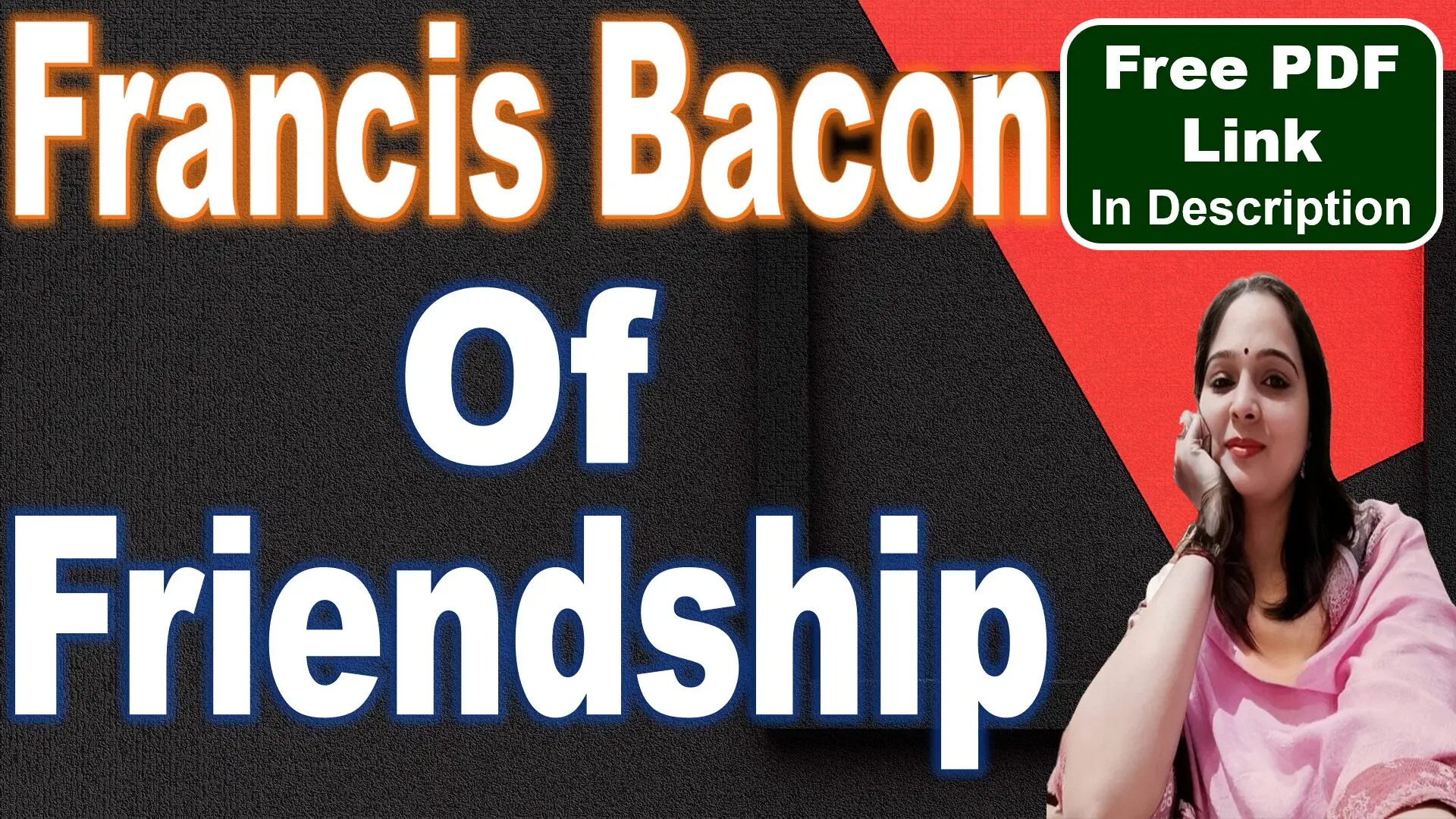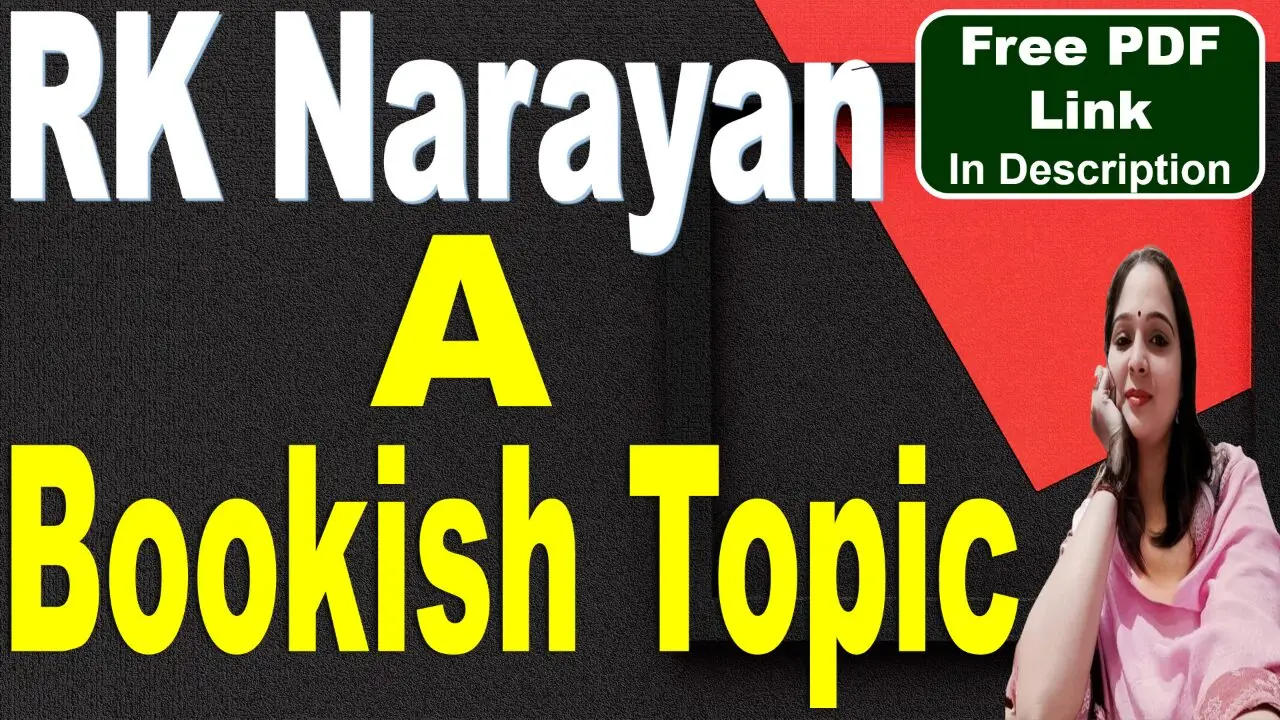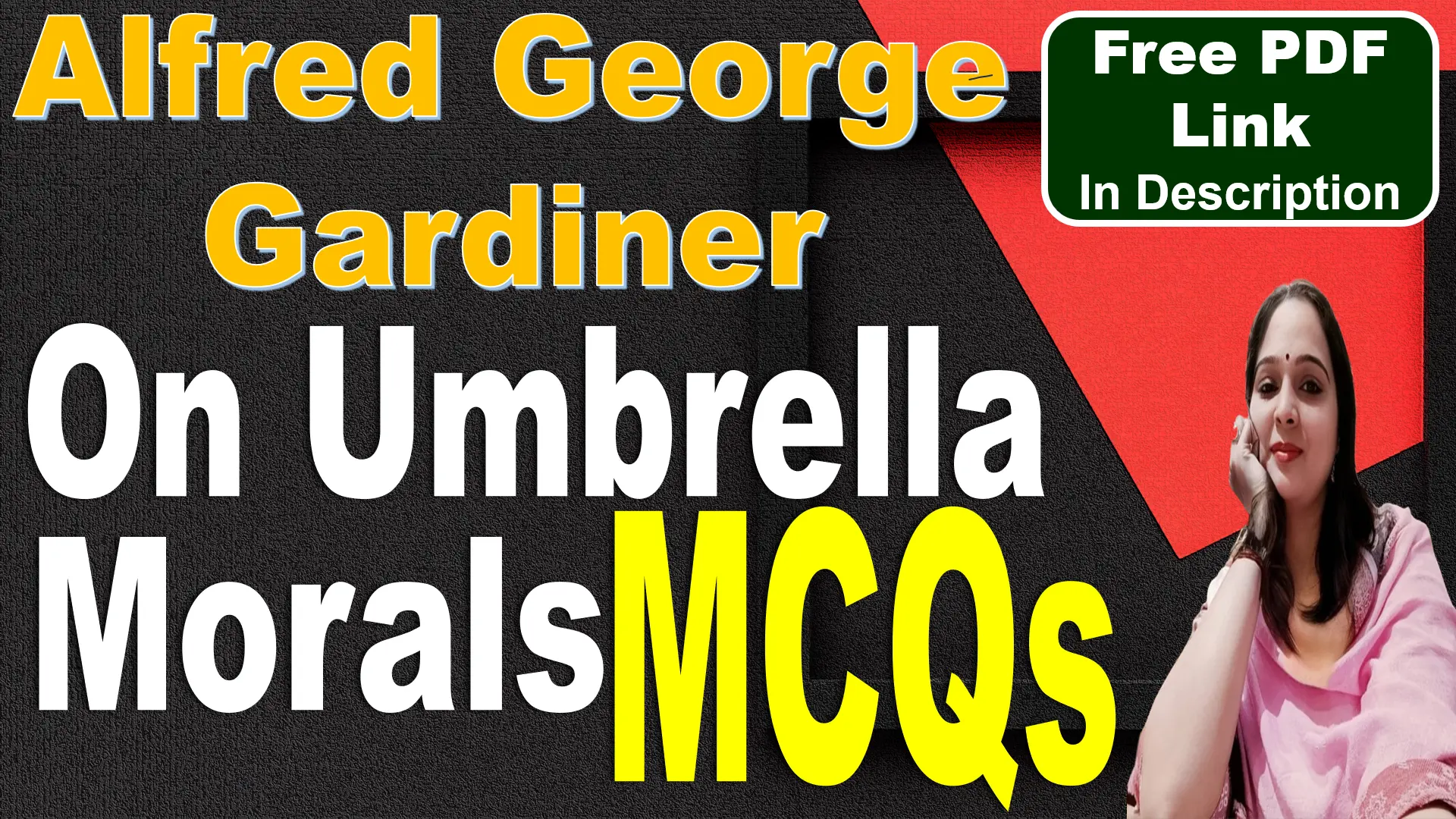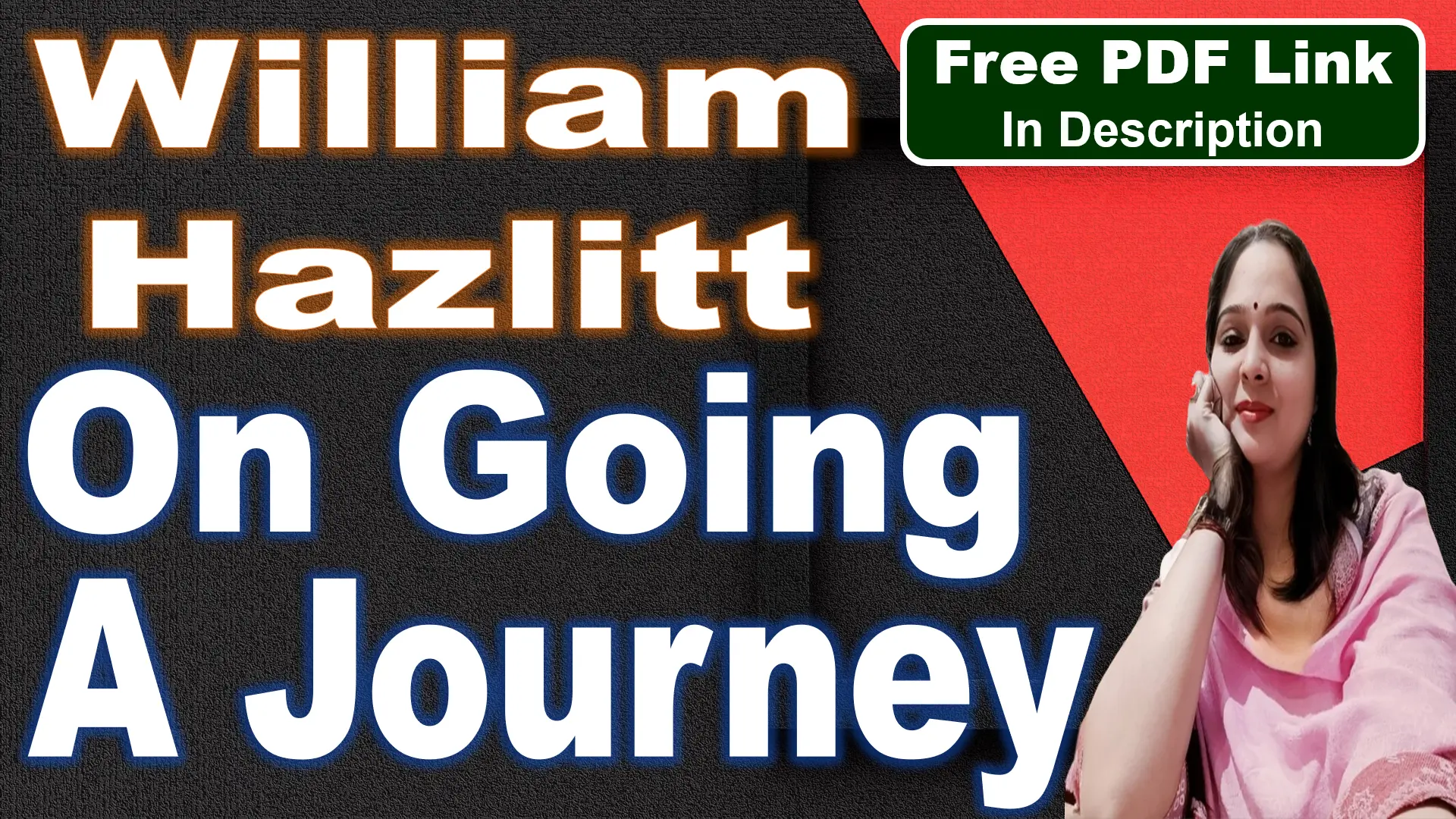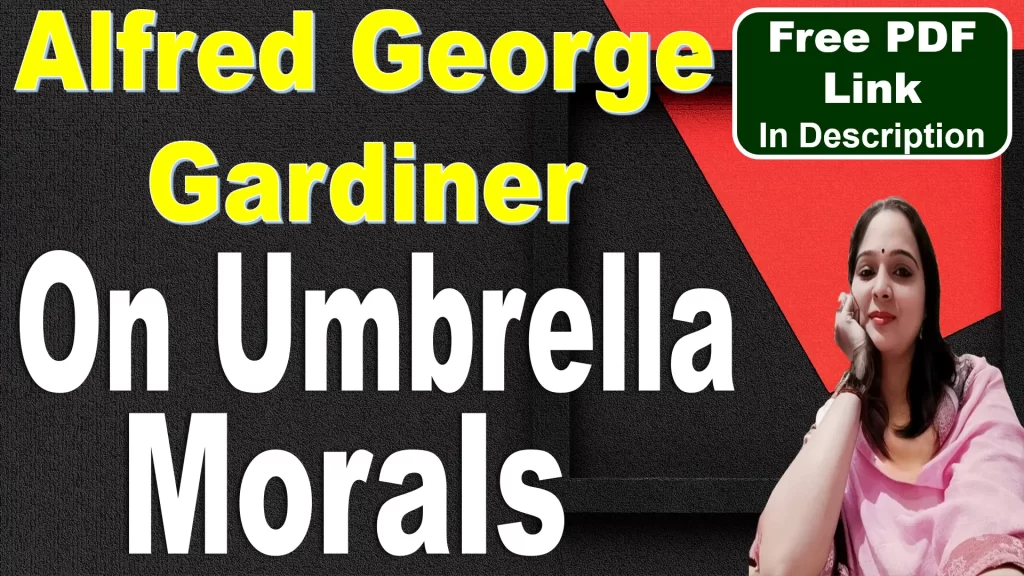
On Umbrella Morals
A sharp shower came on as I walked along the Strand, but I did not put up my umbrella. The truth is I couldn’t put up my umbrella. The frame would not work for one thing, and if it had worked, I would not have put the thing up, for I would no more be seen under such a travesty of an umbrella than Falstaff would be seen marching through Coventry with his regiment of ragamuffins. The fact is, the umbrella is not my umbrella at all. It is the umbrella of some person who I hope will read these lines. He has got my silk umbrella. I have got the cotton one he left in exchange. I imagine him flaunting along the Strand under my umbrella, and throwing a scornful glance at the fellow who was carrying his abomination and getting wet into the bargain. I daresay the rascal chuckled as he eyed the said abomination. “Ah,” he said gaily to himself, “I did you in that time, old boy. I know that thing. It won’t open for nuts. And it folds up like a sack. Now, this umbrella……………………….. Continue
On Umbrella Morals: Video Explanation
On Umbrella Morals Essay Analysis
“A sharp shower came on as I walked along the Strand, but I did not put up my umbrella.”
The writer sets the scene with a sudden rain shower while he is walking down the Strand, a famous street in London. He mentions that he does not raise his umbrella, suggesting an inconvenience or personal reluctance.
“The truth is I couldn’t put up my umbrella. The frame would not work for one thing, and if it had worked, I would not have put the thing up, for I would no more be seen under such a travesty of an umbrella than Falstaff would be seen marching through Coventry with his regiment of ragamuffins.”
The writer reveals that his umbrella is broken, and even if it had been functional, he would still not have used it because of how poor its condition is. The use of the word “travesty” emphasizes the umbrella’s disgraceful appearance. The comparison to Falstaff, a famously disreputable character from Shakespeare, marching with a ragtag group of soldiers in Coventry shows just how unacceptable and embarrassing the umbrella is. This adds humor and self-deprecation to the passage.
“The fact is, the umbrella is not my umbrella at all. It is the umbrella of some person who I hope will read these lines.”
The writer reveals that the umbrella is not his; it has been swapped. This introduces the central theme of the essay—small moral transgressions that we justify. The hope that the person who took his umbrella will read the essay is a playful touch that engages the reader.
“He has got my silk umbrella. I have got the cotton one he left in exchange.”
Here, the writer contrasts the quality of the two umbrellas. His own “silk umbrella” is clearly a desirable, higher-quality item, while the one he is stuck with is described as a lesser, “cotton” one. This adds a layer of humor to the situation as he laments the exchange.
“I imagine him flaunting along the Strand under my umbrella, and throwing a scornful glance at the fellow who was carrying his abomination and getting wet into the bargain.”
The writer imagines the person who took his umbrella, proudly walking along the Strand with it while mocking the person (himself) who is stuck with the “abomination” (his broken umbrella). The image of someone walking confidently with his good umbrella adds to the irony and humor.
“I daresay the rascal chuckled as he eyed the said abomination. ‘Ah,’ he said gaily to himself, ‘I did you in that time, old boy. I know that thing. It won’t open for nuts. And it folds up like a sack. Now, this umbrella….'”
The person who took the writer’s umbrella is imagined to be enjoying the situation, thinking to himself that he got the better deal. The phrase “won’t open for nuts” suggests that the umbrella is so poorly made that it doesn’t even function properly, and “folds up like a sack” highlights how bad the umbrella is. The imagined inner monologue of the thief humorously paints him as someone delighting in this minor misdeed.
“But I leave him to his unrighteous communings.”
The writer dismisses the imagined thief (the person who took his umbrella) and his internal justifications. The word “unrighteous communings” suggests that the person is internally rationalizing or excusing his own actions, even though they are morally wrong. The phrase adds a touch of humor and irony.
“He is one of those people who have what I may call an umbrella conscience.”
The writer introduces the concept of the “umbrella conscience,” which refers to individuals who justify minor dishonest actions without feeling guilty. They hold themselves to high moral standards in major matters (like not stealing or committing serious crimes), but when it comes to small transgressions, they allow themselves to bend the rules. This is central to the essay’s theme of how we sometimes make excuses for small acts of dishonesty.
“You know the sort of person I mean. He would never put his hand in another’s pocket, or forge a cheque or rob a till—not even if he had the chance.”
The writer is describing a person who would never engage in serious crimes such as stealing money or committing fraud, even if they had the opportunity. This is a typical “honest” person, someone who seems morally upright in major matters. The writer establishes this to later contrast it with their actions in smaller situations.
“But he will swop umbrellas, or forget to return a book, or take a rise out of the railway company.”
The writer points out the contradictions in the behavior of these seemingly honest people. While they would never commit a major crime, they do engage in smaller acts of dishonesty. “Swopping umbrellas” or “forgetting to return a book” are examples of minor acts that they justify, even though they are still morally wrong. “Take a rise out of the railway company” refers to exploiting loopholes or cheating a company (like getting away with not paying the correct fare), further illustrating the point.
“In fact he is a thoroughly honest man who allows his honesty the benefit of the doubt.”
The writer sarcastically refers to this type of person as “a thoroughly honest man,” even though they make excuses for small dishonest actions. The phrase “benefit of the doubt” means that these individuals tend to overlook their own moral failings, making allowances for themselves when they do something wrong, even if it’s minor.
“Perhaps he takes your umbrella at random from the barber’s stand. He knows he can’t get a worse one than his own.”
The writer imagines a situation where this person might take an umbrella from a public stand (like a barber’s shop), believing that whatever umbrella he takes will be an improvement over his own, which he already considers bad. This illustrates how small wrongdoings are rationalized—they don’t feel like a big deal because he assumes no harm will be done.
“He may get a better. He doesn’t look at it very closely until he is well on his way.”
The person might even end up with a better umbrella, but he does not inspect it carefully at first. This shows that the person isn’t concerned about the umbrella’s ownership or the act itself. They just act impulsively, expecting to benefit without considering the consequences.
“Then, ‘Dear me! I’ve taken the wrong umbrella,’ he says, with an air of surprise, for he likes really to feel that he has made a mistake.”
When he realizes the mix-up, the person “acts surprised,” as though he genuinely didn’t mean to take the wrong umbrella. The surprise is exaggerated, as he enjoys feeling like his actions were accidental, thus absolving himself of guilt. It’s a form of self-deception—convincing himself that it wasn’t intentional.
“‘Ah, well, it’s no use going back now. He’d be gone. And I’ve left him mine!'”
The person justifies not returning the umbrella by claiming it would be pointless to go back, as the other person has already left. He also convinces himself that it’s not such a big issue since he “left him mine,” implying that both parties have exchanged umbrellas without harm. This further demonstrates how people who have an umbrella conscience find ways to rationalize their actions, regardless of the real wrong they’ve committed.
“It is thus that we play hide-and-seek with our own conscience.”
The writer uses the metaphor of “hide-and-seek” to describe how people try to avoid facing the moral implications of their minor dishonest actions. In this case, people hide from their own conscience, not wanting to admit that they have done something wrong, even though the wrong is small.
“It is not enough not to be found out by others; we refuse to be found out by ourselves.”
The writer points out that it’s not just about avoiding being caught by others; it’s about “not being found out by ourselves”—meaning people often avoid confronting their own guilt or wrongdoing. This suggests that the real moral conflict occurs within ourselves, as we try to justify our actions even when we know they’re wrong.
“Quite impeccable people, people who ordinarily seem unspotted from the world, are afflicted with umbrella morals.”
The writer emphasizes that even “impeccable” people—those who appear morally perfect or unblemished in their actions—suffer from the same “umbrella morals” (justifying small dishonest acts). This challenges the notion that only immoral people do wrong, showing that even good, upstanding individuals can engage in these minor transgressions without guilt.
“It was a well-known preacher who was found dead in a first-class railway carriage with a third-class ticket in his pocket.”
The writer gives a concrete example of a well-known preacher, who, despite being a respected figure of morality, was found to have committed a small dishonest act—he had a third-class ticket when he was traveling in a first-class carriage. This example highlights how even those who are considered morally upstanding (like a preacher) can be guilty of small acts of dishonesty, further illustrating that “umbrella morals” affect everyone, no matter how virtuous they seem.
“And as for books, who has any morals where they are concerned?”
The writer humorously suggests that when it comes to books, people often abandon their morals. The use of “morals” in this context highlights the idea that books, unlike physical possessions, are often treated with a sense of entitlement or disregard for borrowing and returning them. The question suggests that book-related dishonesty is a common, almost excusable offense that people don’t tend to feel guilty about.
“I remember some years ago the library of a famous divine and literary critic, who had died, being sold.”
Gardiner recalls an instance where the personal library of a famous religious figure (a divine) and respected literary critic was sold after his death. The library contained rare books, which adds a sense of importance to the story. It’s significant that the library belonged to someone regarded as morally and intellectually reputable, reinforcing the theme that even the most esteemed individuals might fall victim to small moral failings.
“It was a splendid library of rare books, chiefly concerned with seventeenth-century writers, about whom he was a distinguished authority.”
The library was splendid and filled with rare books, primarily about seventeenth-century writers, an area in which the deceased man was an expert. The description emphasizes the value of the collection and the prestige of the person who owned it. This detail helps contrast the man’s intellectual authority with his moral shortcomings, making his actions (in relation to the books) more surprising.
“Multitudes of the books had the marks of libraries all over the country. He had borrowed them and never found a convenient opportunity of returning them.”
The writer points out that many of the books in the library had “marks of libraries all over the country”, meaning they had been borrowed from various libraries and were never returned. This reinforces the central idea of small moral violations—despite being a respected scholar and preacher, the man had failed to return books he borrowed. The phrase “never found a convenient opportunity” is a humorous excuse, suggesting that he was too busy or found it too difficult to return the books, further illustrating how people rationalize their wrongdoings.
“They clung to him like precedents to law.”
Gardiner uses the metaphor “clung to him like precedents to law” to compare the borrowed books to legal precedents that lawyers often rely on and don’t easily let go of. Just as precedents become ingrained in the law, the books had become attached to the man, and he could never bring himself to return them. This metaphor humorously suggests that the man had an almost legalistic attachment to the books, as though they were a part of his intellectual property.
“Yet he was a holy man and preached admirable sermons, as I can bear witness.”
Despite this moral failing, the writer acknowledges that the man was a “holy man” who preached excellent sermons. This highlights the contrast between his spiritual or moral status and the small dishonest actions he engaged in. It emphasizes that people can be morally exemplary in some areas of life while still falling short in others, especially when it comes to minor transgressions.
“And, if you press me on the point, I shall have to own that it is hard to part with a book you have come to love.”
Finally, the writer admits, somewhat humorously, that it’s hard to part with a book you love, even though it might not be morally right to keep it. This personal admission softens the critique and adds a human element to the story. The writer understands that it’s easy to rationalize keeping something you cherish, even if it belongs to someone else, which is the essence of how umbrella morals (or minor moral lapses) operate.
“Indeed, the only sound rule about books is that adopted by the man who was asked by a friend to lend him a certain volume.”
The writer introduces a “sound rule” for handling books: don’t lend them. This rule is presented as the most practical solution to the problem of lending books, suggesting that once you lend a book, it often doesn’t come back. The setup creates anticipation for the story of the man who adheres to this rule.
“I’m sorry,” he said, “but I can’t.” “Haven’t you got it?” asked the other. “Yes, I’ve got it,” he said, “but I make it a rule never to lend books. You see, nobody ever returns them.”
The man politely refuses to lend a book to his friend, giving a clear “rule” of not lending books. He explains that from his experience, no one ever returns borrowed books. This highlights a common frustration people face when lending items like books, where the borrower often forgets to return them. The dialogue also adds a humorous tone, as the man sticks firmly to his rule.
“I know it is so from my own experience. Here, come with me.” And he led the way to his library. “There,” said he, “four thousand volumes. Every—one—of—’em—borrowed.”
The man then leads his friend to his library, showing him his collection of “four thousand volumes”, all of which were “borrowed.” The emphasis on the large number of books and the drawn-out “Every—one—of—’em—borrowed” underscores the point that his collection consists solely of books that have never been returned. The phrasing adds humor, emphasizing the irony that even the owner of these books does not truly “own” them since they’ve been borrowed.
“No, never lend books. You can’t trust your dearest friend there. I know.”
The man reiterates his rule with conviction, now suggesting that even your “dearest friend” cannot be trusted to return a book. This is an exaggeration that plays on the common experience of lending something valuable to someone, only for it to never come back. It humorously portrays how even close relationships can suffer from the breach of trust that comes with lending books.
“Where is that Gil Blas gone? Eh? And that Silvio Pellico? And…. But why continue the list…. He knows. HE KNOWS.”
The man lists a few specific books, “Gil Blas” and “Silvio Pellico”, that were likely borrowed and never returned, showing that this has happened repeatedly. The “He knows. HE KNOWS” at the end adds a touch of drama and finality, suggesting that both the man and his friend understand the inevitable fate of any borrowed book. The use of capital letters and repetition adds emphasis, showing how deeply the man has internalized the disappointment of lending books.
“And hats. There are people who will exchange hats. Now that is unpardonable.”
Gardiner introduces the topic of hats, emphasizing that exchanging hats is a moral transgression that goes beyond the realm of minor dishonesty. He considers it “unpardonable”, suggesting that it is an act of dishonesty that is harder to justify compared to other minor wrongs like umbrella or book exchanges.
“That goes outside that dim borderland of conscience where honesty and dishonesty dissemble.”
Here, Gardiner suggests that exchanging hats moves beyond the “borderland” where people can hide their actions behind justifications. In the case of umbrellas or books, people may rationalize their actions, but exchanging hats is a more blatant violation of honesty. “Dissemble” means to conceal or mislead, so he is indicating that with hats, the conscience cannot hide the wrongdoing.
“No one can put a strange hat on without being aware of the fact.”
The writer argues that when someone takes a hat that is not theirs, they are fully aware of the act. Unlike umbrellas, which might be taken by mistake or confusion, wearing someone else’s hat is something that cannot be done unknowingly. This implies a greater level of moral awareness when it comes to hats.
“Yet it is done.”
Despite this awareness, the act of exchanging hats still happens. This contradiction is typical of the minor dishonesty that Gardiner is highlighting throughout the essay—people act wrongly even when they know better.
“I once hung a silk hat up in the smoking-room of the House of Commons. When I wanted it, it was gone.”
Gardiner shares a personal anecdote where he hung up his “silk hat” in a smoking-room at the House of Commons, but when he returned for it, it was gone. This adds a bit of humor and real-life context to the essay, showing how even in prestigious or public places, people engage in these small dishonest acts.
“And there was no silk hat left in its place. I had to go out bareheaded through Palace Yard and Whitehall to buy another.”
The writer humorously describes the inconvenience caused by the hat’s disappearance. “Bareheaded” through such important streets emphasizes the awkwardness and embarrassment of the situation, further exaggerating the importance of the hat in the social context of the time.
“I have often wondered who was the gentleman who put my hat on and carried his own in his hand. Was he a Tory? Was he a Radical?”
Gardiner reflects on who might have taken his hat. He humorously imagines various political affiliations for the mysterious person who took it, wondering if they were part of a political group (like a Tory or Radical). This adds another layer of humor, as it suggests that even a hat might have political implications in a place like the House of Commons.
“It can’t have been a Labour man, for no Labour man could put a silk hat on in a moment of abstraction. The thing would scorch his brow.”
He humorously excludes Labour men from the suspects because, according to the writer, they would never wear a silk hat—it would be too uncomfortable. The image of a Labour man with a silk hat humorously clashes with social expectations of class and status, providing further comic effect.
“Fancy Will Crooks in a silk hat! One would as soon dare to play with the fancy of the Archbishop of Canterbury in a bowler—a thought which seems almost impious.”
The writer exaggerates the absurdity of imagining certain figures, such as Will Crooks (a famous Labour politician), in a silk hat. He compares it to the absurdity of imagining the Archbishop of Canterbury (a highly respected religious figure) wearing a bowler hat. This humorously underscores the contrast between what is socially acceptable for different classes or individuals.
“It is possible, of course, that the gentleman who took my silk umbrella did really make a mistake. Perhaps if he knew the owner he would return it with his compliments.”
Gardiner acknowledges that it’s possible the person who took his umbrella might have made an honest mistake, just as he himself has sometimes exchanged umbrellas unknowingly. The tone here softens the critique, suggesting that such things happen in the world of minor moral failings.
“The thing has been done. Let me give an illustration. I have myself exchanged umbrellas—often. I hope I have done it honestly, but one can never be quite sure.”
Gardiner admits that he himself has exchanged umbrellas in the past and that he hopes he was honest about it. This confession adds a layer of self-awareness and humility to the essay. The uncertainty of whether he was honest adds a relatable human element to the essay, showing that even the writer himself falls into the trap of umbrella morals.
“Indeed, now I come to think of it, that silk umbrella itself was not mine. It was one of a long series of exchanges in which I had sometimes gained and sometimes lost.”
Gardiner humorously reflects that the silk umbrella he was so concerned about was actually part of a long series of exchanges, where sometimes he benefited and sometimes he lost. This adds to the theme of moral ambiguity—it’s difficult to be sure about the ethics of minor exchanges, and people often rationalize their actions based on their past experiences.
“My most memorable exchange was at a rich man’s house where I had been invited to dine with some politicians. It was summer-time, and the weather being dry I had not occasion for some days afterwards to carry an umbrella.”
Gardiner recalls a memorable exchange at a rich man’s house during a dinner with politicians. The weather was dry, so he didn’t need an umbrella for several days after the event. The story sets up a moment of social sophistication and political interaction, setting the stage for a humorous revelation.
“Then one day a sensation reigned in our household. There had been discovered in the umbrella-stand an umbrella with a gold band and a gold tassle, and the name of a certain statesman engraved upon it.”
Gardiner describes a moment of “sensation” when a particularly luxurious umbrella was found in his home, with a gold band and a gold tassel. It also had the name of a prominent statesman engraved on it. The discovery of such an umbrella creates a sense of social importance and embarrassment—this isn’t just any umbrella; it belongs to a high-status figure.
“There had never been such a super-umbrella in our house before. Before its golden splendours we were at once humbled and terrified—humbled by its magnificence, terrified by its presence.”
Gardiner humorously exaggerates his reaction to the umbrella’s discovery. The “golden splendours” of the umbrella make him feel humbled and terrified. The umbrella’s luxury and association with a powerful person create a comic sense of guilt, as if the umbrella were too grand for him to possess honestly.
“I felt as though I had been caught in the act of stealing the British Empire.”
He compares the discovery of the umbrella to being caught for a far more serious crime, stealing the British Empire. This is an exaggerated and comic way of expressing his guilt and the absurdity of the situation.
“I wrote a hasty letter to the owner, told him I admired his politics, but had never hoped to steal his umbrella; then hailed a cab, and took the umbrella and the note to the nearest dispatch office.”
Finally, Gardiner humorously describes how he quickly wrote a letter of apology to the umbrella’s owner, explaining that he never meant to steal it, and took the umbrella to be returned. This adds a final layer of humor, as the grand gesture of returning the umbrella seems disproportionate to the minor mistake.
“He was very nice about it, and in returning my own umbrella took all the blame on himself.”
The writer recounts how the man who took his umbrella was very gracious when returning it. He “took all the blame on himself”, meaning he acknowledged the mix-up and did not try to shift the responsibility onto Gardiner. This adds a tone of politeness and humor, as the thief is not only returning the umbrella but doing so in a way that makes him appear generous.
“What,” he said, “between the noble-looking gentleman who thrust a hat on my head, and the second noble-looking gentleman who handed me a coat, and the third noble-looking gentleman who put an umbrella in my hand, and the fourth noble-looking gentleman who flung me into a carriage, I hadn’t the least idea what I was taking.”
The man who took the umbrella provides a humorous and exaggerated explanation for his actions. He describes being “bewildered” by a series of noble-looking figures who offered him various items—a hat, a coat, an umbrella, and even a ride in a carriage. The “noble-looking gentlemen” are portrayed as “flunkeys” (servants or attendants), and the man implies that he was so overwhelmed by the attention and generosity of these figures that he didn’t even realize what he was taking. The humor comes from the absurdity of the situation: the person who took the umbrella blames his actions on the confusion caused by too many offers of luxury items.
“I was too bewildered by all the noble flunkeys to refuse anything that was offered me.”
The man’s final excuse is that he was too “bewildered” by the “noble flunkeys”—the attendants or servants—who kept offering him things, and he felt too polite or overwhelmed to refuse. This is a playful and exaggerated justification for his actions, suggesting that he didn’t make a conscious decision to steal the umbrella but rather accepted it absentmindedly as part of a larger sequence of events. The excuse is both humorous and absurd, highlighting the “umbrella morals” of minor dishonest acts justified by confusion or social pressures.

